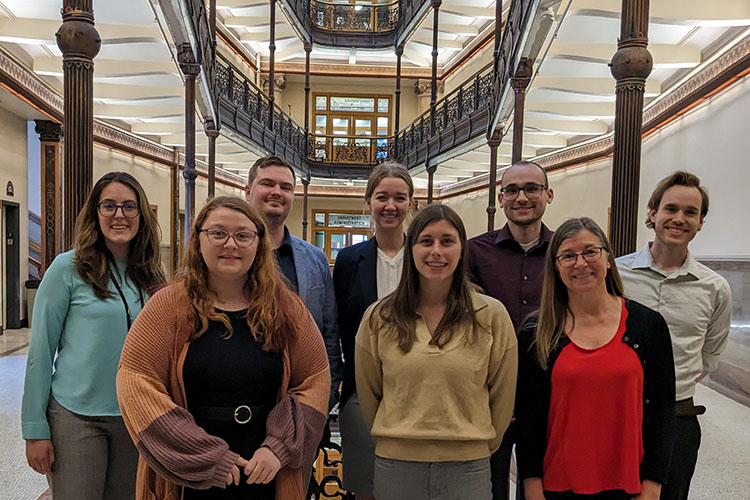As states and municipalities develop long-term, cost-effective and fuel-efficient energy plans, many are evaluating renewable energy sources such as solar, wind, geothermal and hydropower. Wind has become the most prominent, generating more than 10 percent of energy in the U.S.
Offshore wind projects on the East Coast and in the Gulf of Mexico are expanding, which has led to interest in tapping into the wind energy potential of the Great Lakes. Offshore wind projects have been evaluated or are underway off the Great Lakes coasts of Michigan, Ohio, New York and Chicago, but none have been proposed in Wisconsin.
At the request of the Environmental Collaboration Office (ECO) of the City of Milwaukee, six graduate students in the UWM School of Freshwater Sciences developed a preliminary assessment of the feasibility of developing an offshore wind project off the coast of Milwaukee.
The students were enrolled in the School of Freshwater Sciences spring “Freshwater Practicum” graduate-level course, which simulates working in a water consulting firm and connects students to a public sector client to research real-world water challenges and offer recommendations. ECO was their client for the semester-long project.
Under the direction of Professor Melissa Scanlan, director of the Center for Water Policy and Lynde B. Uihlein Chair in Water Policy, students formed a multidisciplinary team and researched critical factors that would play into the feasibility of an offshore wind project. These included legal considerations such as federal and state laws; wind analysis and the potential for wind energy production in Lake Michigan; a review of other offshore projects in the Great Lakes; an environmental analysis including potential impact on fish, migrating birds and bats; funding options and cost-benefit analysis; and a plan for identifying and communication with stakeholders should a project move forward.
Students presented their report, along with preliminary recommendations, in May to people from ECO, the City of Milwaukee Mayor’s Office, and the state of Wisconsin Office of Sustainability and Clean Energy. These recommendations included the kind of wind turbines that would work best, the optimal location for turbines to maximize wind power and avoid environmental and aesthetic impact (approximately 10 miles offshore), and ideas for funding sources and communication. The interdisciplinary approach to the practicum allowed students to dive into their area of study, while also connecting them to a broader goal.
“Working on this project opened my eyes to how my background in atmospheric science can be combined with other disciplines to tackle real-life questions,” said Collin DeYoung, who is in the atmospheric science master’s program and conducted the wind and power analysis for the project. “Professor Scanlan and my classmates also helped me grow as a student and a scientist. It’s one thing to do the research and data analysis; it’s another thing to effectively communicate those results to others to help them make important decisions. I couldn’t think of a better way to develop those skills than working on this consulting project.”
Those who attended the presentation were impressed by the depth and breadth of research.
“ECO supports using academic research from our local universities like UWM to inform public policy and initiatives,” said Erick Shambarger, Director of Milwaukee’s Environmental Collaboration Office. “Although we have no current plans to pursue an offshore wind project, the students and faculty did a great job exploring the economic, environmental, regulatory, and political issues that need to be considered for a project like this to succeed.”
In addition to providing a valuable service to their client, students gained hands-on experience and problem-solving skills that will be highly applicable as they pursue their careers. Joe Bevington, the student team manager and a student in the master’s thesis program focused on water policy, previously worked for a natural resource management agency. He is interested in working in the public sector again but the course showed him consulting’s potential to make a difference.
“Through this class, we have been introduced to the wide array of environmental/water consulting firms out there,” he says. “What makes working in the consulting field appealing is the bandwidth to pursue and accomplish projects, and the latitude these groups have to make positive impact on the landscape.”
Nina Hartwig, who is in the professional master’s program, agrees, and highly recommends the course. She says: “The practicum course allowed me to get experience in the consulting field and understand what career opportunities I could have in it. It challenged me in a way no other course has, but in the best way possible. I was able to grow my professional abilities and provide our client with information that could incite real change in the world. I would encourage everyone to take this course!”
